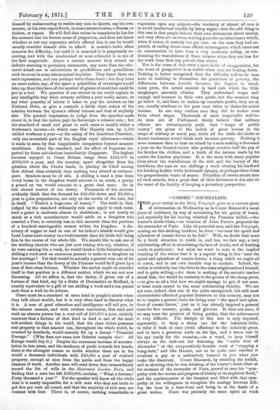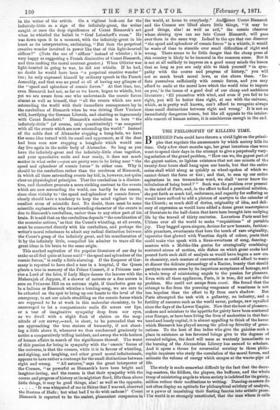" COSMIC " JOURNALISM.
T"great writer in the Daily Telegraph gave us a curious piece of information on Wednesday as to Count Bismarck's usual- place of residence, by way of accounting for his gaiety of heart,. and especially for his having whistled the Prussian hallali,—the hunter's death-blast,—on occasion of Jules Favre's proposals for the surrender of Paris. Like all powerful men, said the Telegraph, musing on this striking incident, he lives "too near the speed and splendour of cosmic forces to be dull." Well, no doubt that must be a lively situation to reside in, and has, we dare say, a very exhilarating effect in stimulating the love of music, and of hunting music in particular ; but what we want to note is the implied teaching of the writer that it is a capital thing to live 'near the speed and splendour of cosmic forces,' a thing which we ought all to covet, and in our own humble way to emulate. Indeed, the writer is evidently one who lives in the same neighbourhood himself, and is quite willing,—for there is nothing of the esoteric teacher about him, that would be contrary to the genius of the cheap press, —to give us all a hint how we might manage to get, if not near, at least much nearer to the same exhilarating vicinity. We are not sure, indeed, that one of the quite unexpected, but still most characteristic effects of popular literature in this country, may not be to inspire a general taste for living near " the speed and splen- dour of cosmic forces," just as it has already inspired a general taste for fine scenery, peaks, and glaciers. It does not seem, if we may trust the greatest of living guides, that the achievement is very difficult. The disciple of this lore is only required, apparently, to keep a sharp eye for the infinitely-little, to refer it back at once (with effusion) to the infinitely-great, and to have a generous smile on his lips, and a warm tear in his eye ready for the occasion,—in a word, to keep himself always on the look-out for detecting the " noble dust of Alexander" at the comparatively humble work of "stopping" a bung-hole," and like Hamlet, not to be quite sure whether it awakens a gay or a melancholy humour in you when you make the discovery. Count Bismarck, by whistling the hallali, and so showing that he was thinking of the hunter's death-blast at the moment of the surrender of Paris, proved at once his "sym- pathy with the course and progress of history at its mightiest flood," and the condescension of the buoyant soul filled with that sym- pathy in his willingness to recognize the analogy between kill- ing the boar in a boar-hunt and being in at the death of a great nation. There was precisely the same spirit at work
in the writer of the article. On a vigilant look-out for the infinitely-little as a sign of the infinitely-great, the writer caught at once the deep significance of Count Bismarck's act when he whistled the hallali in " Graf Lehndorfrs room." He was down upon it in a moment, with the infinitely-great in his heart as its interpretation, exclaiming, "But then the perpetual creative wonder involved in power like that of this light-hearted siffleur?" (Note the use of siffieur ' instead of whistler ; it is very happy as suggesting a French diminutive of Count Bismarck, and thus making the moral contrast greater.) When 011ivier was light-hearted in going to war, he did not whistle. If he had, no doubt he would have been "a perpetual creative wonder" too ; he only expressed himself by ordinary speech in the French Assembly, and that was no proof at all of having any glimpse of the "speed and splendour of cosmic forces." At that time, too, even Bismarck had not, as far as we know, begun to whistle, but yet we are aware from one who understands the cosmic forces almost as well as himself, that " all the events which are now astounding the world with their immediate consequences lay iu the cerebellum of Bismarck when he was driving Herr Virchow wild, horrifying the German Liberals, and chatting so ingenuously with Count Benedetti." Bismarck's cerebellum is here " the infinitely-little" (of course, only quantitatively) "as compared with all the events which are now astounding the world." Instead of the noble dust of Alexander stopping a bung-hole, we have the same idea turned with its small end uppermost, as if the dust had been seen now stopping a bunghole which would one day live again in the noble body of Alexander. So long as you have the infinitely-great and the infinitely-little close together, and your speculative smile and tear ready, it does not much matter in what order ;—you are pretty sure to be living near " the speed and splendour of cosmic forces " in either case. Why it should be the cerebellum rather than the cerebrum of Bismarck, in which all these astounding events lay hid, is, however, not quite clear on physiological principles. That the cerebellum is a diminu- tive, and therefore presents a more striking contrast to the events which are now astounding the world, can hardly be the reason, since close vicinity to ' the speed and splendour of cosmic forces' clearly should have a tendency to keep the mind vigilant to the smallest atom of scientific fact. No doubt, there must be some scientific explanation why the astounding character of the events is due to Bismarck's cerebellum, rather than to any other part of his brain. It is said that on the cerebellum depends " the combination of the muscular actions," so that the Count's whistling, at all events, must be connected directly with his cerebellum, and perhaps the writer's moral reluctance to admit any radical distinction between the Count's grasp of the infinitely great, and his manifestation of it by the infinitely little, compelled his admirer to trace all the great ideas in his brain to the same origin.
This marked aspiration of the popular literature of our day to make us all feel quite at home amid " the speed and splendour of the cosmic forces," is really a little alarming. If the Emperor of Ger- many is reported to have shed a tear in a hospital, if the Queen plants a tree in memory of the Prince Consort, if a Princess mar- ries a Lord of the Isles, if Lady Mayo dances the lancers with the Maharajah of Jeypore, if a shower of meteors or a fine aurora is seen on Primrose Hill on an autumn night, if Gambetta goes up in a balloon or Bismarck whistles a hunting-song, we are sure to be exhorted on the spot to bring up our hearts to the level of the emergency, to set our minds straddling on the cosmic forces which are supposed to be at work in this molecular chemistry, to be encouraged to let a compassionate smile flit across our lips, or a tear of imaginative sympathy drop from our eyes, as we dwell with a slight flush of elation on the mag- nitude of our survey,—and, in short, to be persuaded that we are approaching the true stature of humanity, if not shoot- ing a little above it, whenever we thus condescend graciously to notice a comparatively trifling incident, and sweep the wide horizon of human affairs in search of the significance thereof. The worst of this passion for being in sympathy with the ' cosmic' forces of the universe, is that the cosmos, while it is in favour of whistling, and sighing, and laughing, and other grand moral infinitesimals, appears to have rather a contempt for the small distinctions between right and wrong. " All natures," says the great interpreter of the Cosmos, "as powerful as Bismarck's have been bright and laughter-loving, and the reason is that their sympathy with the course and progress of history at its mightiest flood, lifts them above little things, it may be good things, alas ! as well as the opposite. It was whispered of me in Shiraz that I was sad, observed the Rustum of Hafiz ; but what had I to do with sadness?' Count Bismarck is reported to be the easiest, pleasantest companion iu the world, at home to everybody." AndEsince Count Bismarck and the Cosmos are lifted above little things, " it may be good things, alas ! as well as evil," the cosmic observer whose shining eyes can see into Count Bismarck, will pass over them in the same way. Indeed to the eye that can discover "the speed and splendour of cosmic forces" in a whistle, it would be waste of time to stumble over small difficulties of right and wrong. There seems to be little danger that the cheap press of this country is likely to be immoral in the common sense. But it is not at all unlikely to impress on a good many minds the lesson that so long as you are only able to think yourself " in sym- pathy with the course and progress of history," you will
not so much break moral laws, as rise above them. In- flate yourselves sufficiently with cosmic forces, and you may afford to smile at the moral laws which the world tries to impose on you,' is the lesson of a good deal of our cheap and ambitious literature ; fill yourselves with wind, and even if you fail to be right, you will be better than right, at one with the universe, which, as is pretty well known, can't afford to recognize always these small distinctions between right and wrong.' It is not an immediately dangerous lesson, but like all appeals to the intoler- able conceit of human nature, it is mischievous enough in the end.































 Previous page
Previous page